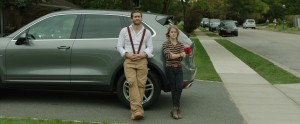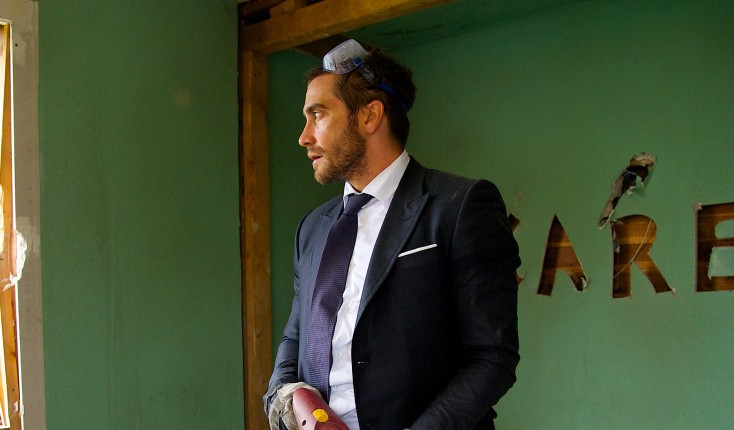
Jake Gyllenhaal as “Davis” and Judah Lewis as “Chris” in DEMOLITION. Photo courtesy of Fox Searchlight Pictures © 2016 Twentieth Century Fox Film Corporation All Rights Reserved
By ANGELA DAWSON
Front Row Features
NEW YORK—In the drama “Demolition,” Oscar nominee Jake Gyllenhaal (“Brokeback Mountain”) plays a successful investment banker named Davis, who suffers a major breakdown after losing his wife in a tragic car accident and then has to rebuild himself from the ground up.
During Davis’ breakdown, his domineering father-in-law Phil (Chris Cooper, “American Beauty”) pressures him to pull himself together, to no avail. Then, what starts as a complaint letter Davis sends to a vending machine company turns into a series of missives that reveal startling personal admissions. His correspondence catches the eye of customer service rep Karen (Naomi Watts, “The Impossible”), who is dealing with her own emotional and financial problems. These two troubled souls form an unlikely connection, and with the emotional support of Karen and her son, Chris (Judah Lewis, “Point Break”), Davis starts to rebuild his life, beginning with the demolition of the one he previously knew.
The drama is directed by Jean-Marc Vallee (Oscar nominated for “Dallas Buyers Club”), and based on a script by Bryan Sipe (“The Choice”).
“Demolition” reunites Gyllenhaal with Cooper, with whom he previously co-starred in 1999’s “October Sky,” when the former was only 16. Now 35, Gyllenhaal reveals he has reached the point in his career where he has amassed a bag of tools to draw upon to construct his characters.
Q: What was your initial attraction to this project?
Gyllenhaal: For me, the first thing was John-Marc (Vallee, the director). His process is now famous in terms of how he goes about making his movies. I also love Canadian filmmakers, so that’s like something happens and I have to do it. I don’t know what it is, but it’s some unconscious pull that neither they nor I, in the end, are very happy about, but we make good movies.
What I loved about the script when I read it was what I didn’t like about it, initially. I first started reading it and the first scene happens and you go, “OK, I’ve seen this before.” Then all of a sudden this movie happens, this thing where every time you think you’re going down a conventional route and you’re about to eye roll, something comes and sideswipes you, and you go, “Whoa.”
Q: What was that moment?
Gyllenhaal: Almost every moment, like every five or 10 pages I would go, “OK, here comes the woman who he’s going to have a romantic affair with,” and then I’d go, “No, that’s not.” Or, “OK, the kid comes out of the closet and now’s the scene he starts moving closer to him. He’s going to try and kiss him,” and actually, it’s like, “No, oh wait.” He just tries to make him smile. Or even the point when Chris Cooper’s character says, “You’ve got to take things apart without…” and it’s even called “Demolition,” and I thought, “Oh, great. We’re all going to be seeped in metaphor here.” But they actually (expletive) destroy a house! Those kinds of things.
Overall, I thought, “Where’s the cathartic moment?” When is this guy going to come to realize, “I made all these huge mistakes” and we’re going to really empathize with this guy? As I finished it, I had this feeling of apathy is equal to empathy. I just thought, what an interesting thing in a movie about loss. Quite often, we’re reading something or we’re watching something where we you have to empathize with the character. How do we make him relatable? This is a not a very relatable character.
Q: How did they make you look so vulnerable? Your character’s a little bit emotionally unbalanced.
Gyllenhaal: There’s logic to that. You begin the movie at a place where he has made a number of choices based totally on the convention of what people tell him he’s supposed to be doing. As he made those choices throughout his life, what he’s lost is himself, or how he feels about pretty much everything. So when this tragedy happens and he’s devastated, he doesn’t even know he’s devastated because he doesn’t even know where his feelings are. He doesn’t even know where they lie. So he looks like he’s like a sociopath.
What you realize is, in a way, all those things that we’ve decided to do—I speak for myself—are based on what convention tells you. You don’t really ask yourself how you actually feel about those things, if you actually like those things. Some people say, “I love this song. Yes, it plays on the radio 100 times a day, but it brings me joy. I love it.” Then somebody else says, “I like it because I’m supposed to like it.” It’s the person who’s supposed to like it that I think doesn’t know exactly how they feel because they’re afraid to tell people that they just don’t like it.
Q: Have you ever experienced that in acting? How do you find the place to be real, between conventional roles of doing things in a certain way and intuition?
Gyllenhaal: I always try and come prepared with a sense of reality myself, knowing that what I think sometimes is most interesting about a scene is when someone calls you out on your (expletive) or you call someone else out. When somebody’s honest, I think it just makes you look at yourself. Working with someone like Chris Cooper, there’s a tendency to say, “Oh, why don’t I feel so…” There’s a brutality to his honesty in how he works. You always come to a scene trying to bring the most of what you know about yourself. That’s my approach.
Q: Regarding the darkness of the character, there’s definitely a pace to it and a darkness to it that spans the film. The viewer gets caught up in that pace. When the filming day is over, do you take it home with you or do you turn it off until the next day when you’re back on set, or is this part of you all the time during the filming of this movie?
Gyllenhaal: It’s a little bit of both. I believe really deeply in the unconscious, so I believe that those things seep in. I believe we’re communicating things all the time. Yeah, there’s a part of me that goes out or goes out to dinner and I have my life as it is, but my emotional response to things sometime will mimic the character that I’m in. Or, feelings I have and the world that I exist in will come into play.
But I also know that there’s a place for craft. That’s why I believe in craft. It’s why I believe in there being an analytical side to acting and an intellectualism. I think education is so important if you’re going to do this craft. It seems to look easy but I find it to be a mission that is impossible in a lot of ways. That’s why I deeply believe in an education. I deeply believe in doing research, being prepared.
In this movie, for instance, Jean-Marc didn’t want me to prepare at all. He was like, “I’ll see you on set.” I’m like, “Are we going to rehearse? And he said, “No, I’ll see you on set.” Then he threw me into a place where I was uncomfortable, because I have a way in which I do my work. So, yes, I do take it home. I didn’t know this early on. It takes a while to get rid of those behaviors. You have to be thoughtful and you have to be caring and you have to have people around you who know or appreciate what you do, who don’t just look at you as though you’re crazy.
I think also it’s like if you have a well-built ship, when you get into a storm, most of the time you’re going to be all right. Feelings are like that storm. You just have to build that ship as a craft.
Q: You’re 35 now, and it’s a big jump, usually, for so many young actors to go from being like juveniles to actually be able to play adults and then move on from that. When was the point where you felt like you made that transition and you were conscious that you were no longer going to be playing the young guy but an adult for the rest of your career?
Gyllenhaal: I don’t think there was a time where I made that decision or I thought about that really. I do think I realized that there was a moment in which I couldn’t just show up to set and learn my lines, and because I have some sort of innate understanding of the rhythms of the scene, and I have a confidence in front of the camera that I’ll be OK. There’s a moment, as you become an adult, where hard work is actually the thing that begins to separate you (from your youth). Beyond the love and beyond the passion for what you do, you have to work hard. I don’t know when that really happened. I think I always had it in me.
There were a number of things along the way. I made “Zodiac” when I was pretty young. With that movie, I didn’t have the work ethic I have now. I watched (the film’s director) David Fincher and his work ethic. I had—at the time—a lot of criticism for that in my mind, but, ultimately, I have adopted that same type of work ethic. I think there are those moments along the way. I don’t think there’s just one moment. There are moments where I just started to learn from different people and as you learn, you pick up. You start using those.
Like, with Chris Cooper, whom I finally got to a scene with him on (“Demolition”) after working with him when I was 16 on “October Sky.” When we were making “October Sky” I had no idea the reason why he was so aloof and weird and didn’t talk to me was because that’s what his character would do. Now, I have all the same tools. You just accumulate them. One day you wake up and I guess you’re grown up.




